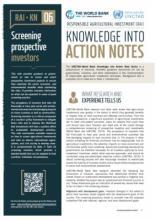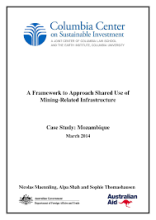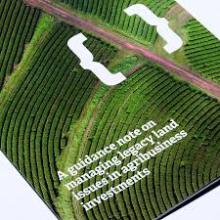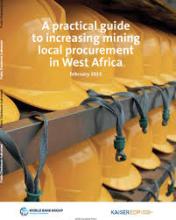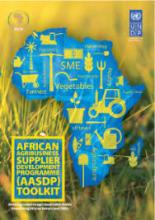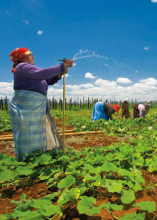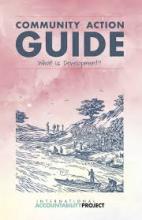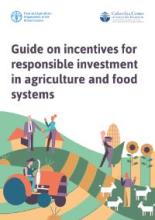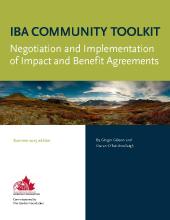Resources for Benefit-sharing
6 - Screening Prospective Investors - Responsible Agricultural Investment (RAI): Knowledge into Action Notes series
This note is part of an Action Notes series and provides guidance to governments on how to screen and select prospective investment projects to ensure they maximize the social, economic, and environmental benefits while minimizing the risks. It provides investors information on what can be expected in cases of good screening practice.
A Framework to Approach Shared Use of Mining-Related Infrastructure
The framework provides guidance to policy makers on how to approach the question of shared use. It highlights the operational models that are necessary for implementation, the key-success factors, the enabling conditions and how to ultimately better coordinate major investments in physical infrastructure by privately-owned natural resource concessionaires with national infrastructure development plans. The framework also equips policy makers with a set of questions that should help conduct the negotiations on shared use with companies.
A guidance note on managing legacy land issues in agribusiness investments
This document provides guidance to agribusiness companies and investors that face legacy land issues and seek to manage them to manage social impacts for project-affected communities. It outlines tools to address these issues and safeguard the rights of local communities, and to promote community development and business opportunities for mutual benefits.
A practical guide to increasing mining local procurement in West Africa
This document provides information, guidance and tools to support decision-making, planning and implementation of mining local procurement, in particular at a country level. It can be used by individual role players as well as form the basis of consultative processes. The guide can also support regional harmonization relating to mining local procurement. Although based on West Africa, it will be a useful resource in other regions.
African Agribusiness Supplier Development Programme (AASDP) Toolkit - Growing inclusive agri-food value chains benefitting African famers and SMEs
This resource provides tools for companies and buyers to improve responsibility and due diligence along the commodity supply chain, building on the Agribusiness Supplier Development Programme (ASDP). It
• provides a brief introduction of the issues,
• provides an in-depth background on the African agricultural economy and the position of smallholders suppliers, SMEs and business in this,
• lays out an overview of the programme’s phases and activities, its governance model, the roles and responsibilities of the various actors within a supply chain, as well as budget and finance, and the setup of a Monitoring and Evaluation (M&E) system, plus an exit strategy,
• provides a range of applied tools and methodologies for implementing the six phases of an ASDP, M&E and impact measurement.
Community Development Toolkit
The ICMM has developed 20 tools to support mining and metals companies in promoting sustainable community development. These tools will also be useful to companies involved in other sectors. They offer practical guidance for every stage of the mining process from exploration, construction and operations, to decommissioning, closure and ultimately, the post-closure environment.These tools are accompanied by easy-to-use, step-by-step route maps, to help:
• Foster constructive working relationships between communities, companies and governments
• Build capacity within governments, companies and local communities to address sustainable development at local level
• Improve understanding of local community development processes
• Promote the potential of mine development and operation to add value to sustainable social and economic development
Community-Action Guide: What is Development?
This guide encourages communities to discover what development means for themselves and to question whether proposed plans and activities truly fit within their definition of and priorities for development. With activities, stories, and practical tools, this guide introduces community-led development and supports communities in claiming their right to development.
Guide on incentives for responsible investment in agriculture and food systems
Increased investment in agriculture and food systems—from both the private and public sectors—is critical to enhance food security and nutrition, reduce poverty, and adapt to climate change. To generate sustainable benefits, this investment must be responsible. What role should investment incentives play in encouraging such investment? This Guide helps to answer that question. Specifically, the Guide provides policymakers and government technical staff with guidance on how investment incentives can be used (and how they should not be used) to enhance responsible investment in agriculture and food systems. The Guide provides an overview of responsible investment in agriculture and food systems; examines common types of incentives; offers general considerations on how incentives can be used; and discusses how to plan for, design, monitor, and evaluate investment incentives for responsible investment in agriculture and food systems.
IBA Community Toolkit: Negotiation and Implementation of impact and benefit agreements
This toolkit provides guidance on the making of fair arrangements that guarantee local benefits to community negotiators and consultants who work with Indigenous communities in Canada. This involves negotiation techniques and strategies. It focuses primarily on the mining sector, but it will be useful in the context of other sectors and contexts too.
This resource is part of the CCSI’s Directory of Community Guidance on Agreements Relating to Agriculture or Forestry Investment.
Improving transparency and accountability in the flow of benefits to mining communities
This report seeks to investigate and propose mechanisms that can be used to improve the flow of benefits to mining-affected communities. The report sets out what requirements should be met for a community trust (or similar legal vehicle) to offer protection of trust assets. It sets out recommendations on the manner in which the legal document should be crafted to protect communities, and proposes that the time is ripe for regulation and clarity. Although it is focused on South Africa, it will be relevant for countries facing similar challenges in the mining and other commercial sectors.


